Near the bottom of the 2008 financial collapse, many investors convinced themselves that Barack Obama’s left-leaning ideology would only make things worse for the stock market. They were wrong. Indeed, those folks missed a remarkable opportunity to acquire equities at phenomenal bargains.
Leading into the 2016 election, plenty of people believed that Donald Trump’s unpredictable nature and tempestuous style would result in a stock market disaster. They were wrong too. Wall Street quickly warmed up to the prospect for dramatic reductions in corporate taxes, sending stocks skyward.
For more than three decades, I have counseled investors to put aside their political feelings. Those emotions rarely prove beneficial. Instead, folks ought to focus on fundamental valuation, the business cycle (a.k.a. “credit cycle”) and technical trends.
As we barrel toward the 2020 election, however, I must acknowledge the uniqueness of the risks. Would a Democrat sweep in Congress result in the rolling back of tax reform? The possibility of higher corporate tax rates would further aggravate the “E” in P/E at a time when most metrics already point to dramatic overvaluation and an earnings slowdown.
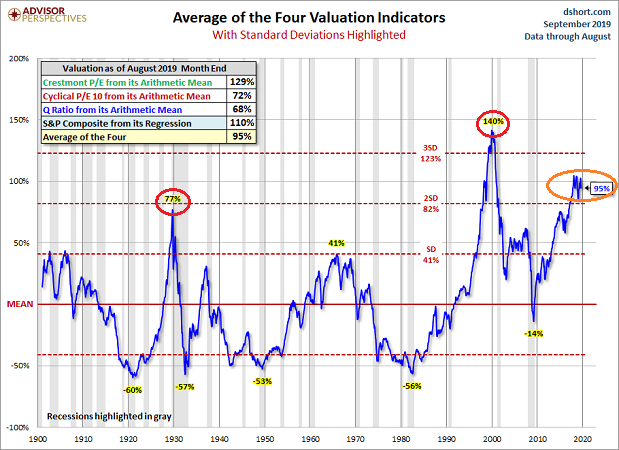
In a similar vein, the trade war has adversely impacted the profits at scores of U.S. corporations with sizable overseas operations. Could Trump’s reelection contribute to global economic contraction? At a moment when the global economy is clearly on the ropes, there may be a tipping point whereby a recession in 2020 or 2021 becomes an inevitability.
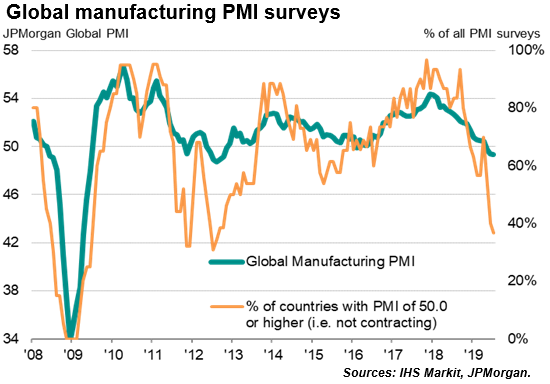
Another undeniable brick in the wall of worry? Both parties seem oblivious to the dangers of quantitative easing (QE) and ultra-low interest rate policies. Yet both Dems and Repubs would welcome short-term adrenaline boosts by the Federal Reserve. Regardless of the way it creates malinvestment and bubbles. Regardless of the way it destroys saving and fosters excessive borrowing.
Keep in mind, former Fed Chairman Alan Greenspan has exclaimed that the U.S. will definitely resort to negative interest rates in the future. Just like Europe. Since negative interest rate policy became the norm at the European Central Bank (ECB), the damage to European financial firms is undeniable.
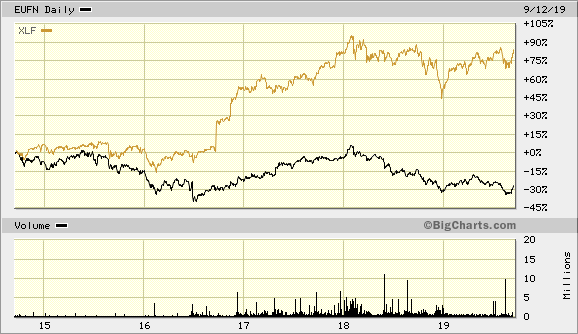
Would the U.S. stock market really be okay if the European banking segment failed to survive? Is our exposure genuinely negligible?
Granted, commentators love to say that stocks climb the proverbial “Wall of Worry.” Then again, a time always comes when there are a few too many bricks.
Consider these additional warning signs:
1. Junk Bonds. The risk in the high-yield bond market may have reached its highest level since crashing oil prices hit energy-company debt in 2016. In particular, the U.S. distress ratio, which is the proportion of junk bonds that yield more than 10% above comparable Treasury bonds, leaped to 9.4% in August.
2. Earnings Growth (or lack thereof). According to FactSet, the estimated earnings decline for the S&P 500 for Q3 2019 is -3.6%. Granted, the negative bar may make it possible for companies to easily beat expectations. On the other hand, if we see an actual year-over-year decline for Q3, that would be three quarters of negative earnings growth in a row for the heralded index.
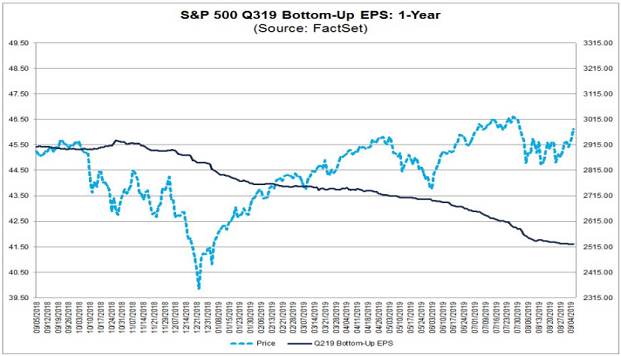
3. Consumer Confidence. The brightest spot in all of the U.S. economy has been the willingness of the consumer to spend. People are working. And people are spending. Yet consumer confidence indicators have been diverging, with the Conference Board’s reading sitting near highs and the University of Michigan’s sentiment moving sharply lower.
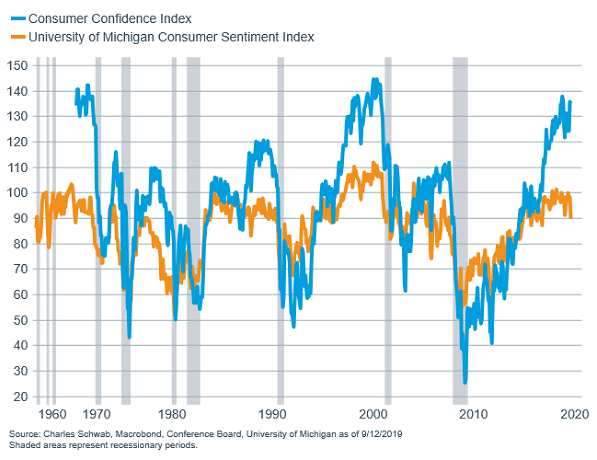
4. Corporate Spending. Nobody knows more about the capital spending intentions of corporations than Chief Financial Officers. So when 67% of U.S. CFOs anticipate that the U.S. will be “in recession” by Q3 2020, and 84% by Q1 2021, the data are probably telling.
5. Recession Indications. Speaking of the probability that a recession will occur within the next 12 months, perhaps in Q3 2020, the New York Fed’s model reached 37.3%. Think that’s low? Think again. While recessions have occurred without ever getting as high as 35% on the Fed model, or 37.3%, they’ve ALWAYS occurred in conjunction with the model hitting these percentage levels or shortly thereafter. (See the orange line below.)
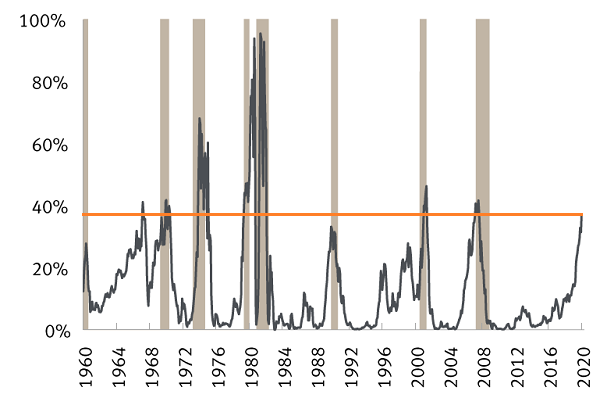
Additionally, the Organization for Economic Cooperation and Development (OECD) provides a composite leading indicator for identifying turning points in business cycles. The U.S. is currently at its lowest point since 2009. What’s more, the last time that the indicator breached 99 on the downside, the 2008 Great Recession was underway.
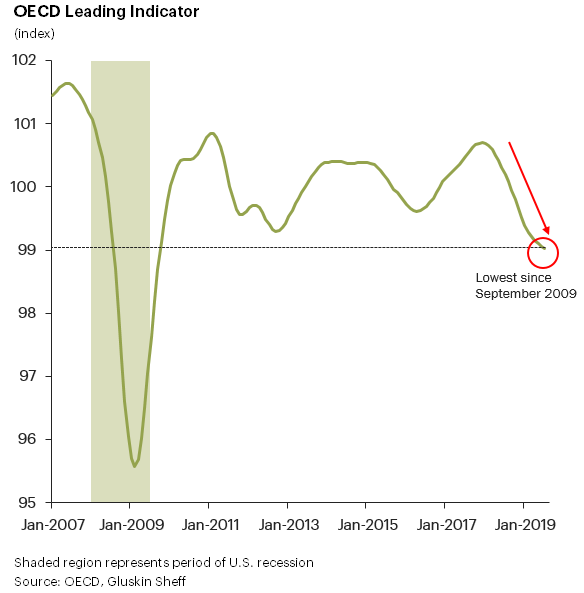
Naturally, a host of articles have been written about the inverted yield curve and the likelihood of recession. For that matter, many export-dependent countries are already in recession. I won’t repeat the discussion here.
Nevertheless, there is uncertainty about everything from Federal Reserve policy to global trade skirmishes with China, from corporate earnings to European economic malaise, from consumer retrenchment to potentially damaging ramifications in the political theater. It may be naive to ignore the Wall of Worry entirely.
Expect a downward pressure on interest rates to resume, regardless if the Fed is foolish enough to utter the words, “mid-cycle adjustment.” Real estate investment trusts (REITS) continue to benefit. Preferred stock shares do as well.
In fact, you may want to look at “REIT Preferreds” if you are wary of the riskier REIT holding. Take a look at possibilities such as Digital Realty Trust Inc Preferred Series I (NYSE:DLR) and CorEnergy Infrastructure Trust Dep Shares Preferred Series A (NYSE:CORR).
